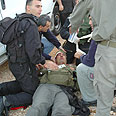


"We are calling on the Jews of Peki'in and all those who are interested to come back and live in Peki'in, however we will not agree to again take in provocateurs," the leaders said.
The speakers described the riots of October as an anomaly that would not have long-term consequences
on Jewish-Druze relations in the Galilee or in Israel as a whole.
The assembly featured many members of Galilee municipal and regional councils as well as Zionist leaders such as Jewish Agency Chairman Ze'ev Bielski.
Leaders of the Druze community showed up in force. They brought up what they saw as the catalysts for the rioting.
Other speakers, primarily heads of Jewish municipalities, remarked that the events that took place in Peki'in were primarily the result of frustration brought on by discrimination, a lack of infrastructure, jobs and education.
'Troublemakers stay out'
Peki'in local council head Muhammad Kheir called on the Jewish families that lived in the town to return, although he and other speakers noted that two Jewish families seen as provocateurs were not welcome to come back.
"It's as if someone comes into your home, goes into the living room, creates a mess and flips over the couch. (All the Jewish residents) were welcome and are still welcome except for those people."
Chairman Bielski spoke about the rioting and warned about taking democracy for granted: "Democracy is an invaluable gift but it has its limits. We also have criticism about police conduct, but when people attack a governmental body they need to act carefully.
"Today it is the police, tomorrow it is the court and later the military. In a democratic regime we don't raise our hand against the police even if it seems to us that the police presence is exaggerated."
The Jewish Agency has about 25 buildings that it has acquired through the years in Peki'in's center. The buildings are not suitable for habitation and the town leadership is requesting that the agency remodel them and allow them to be used as public buildings.















